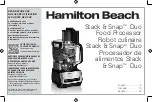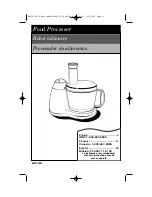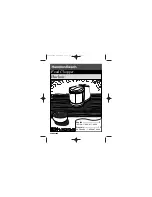
Chapter 7. Service
7-1
Chapter 7. Service
Introduction
The
Service
Menu is used to set up a user-
defined access code and to perform trouble-
shooting functions. This chapter covers the
functions in the
Service
Menu. Explanations
of each of the functions are provided. Addi-
tionally, navigation procedures through the
menu tree are provided for some of the
functions.
As shown in Figure 7-1, the
Service
Menu
has five submenus:
1.
ADC
— allows you to display material
weight and the equivalent A/D counts;
enable or disable monitoring for a channel;
adjust the excitation, effective resolution,
and gain; set (or reset) default parameters
for a specific channel; and set up and
enable filtering and tracking parameters
that reduce the effects of ‘noise’ and drift.
2.
Setpt
— allows you to turn the setpoint
relays on and off for test purposes.
3.
4/20
— allows you to calibrate the 0/4 and
20 mA outputs and set the current trans-
mitter output to specific values for test
purposes.
4.
Micro
— allows you to clear the 16-
character customer-defined ID, test the
keyboard, print setup information for each
vessel, reset the non-volatile RAM to
default parameters, and test the non-
volatile RAM.
5.
Access
— allows you to set up a user-
defined access code; also allows you to
enter the KM Mfg Code, which is needed
when performing certain troubleshooting
functions.
Note
You should not attempt to perform
troubleshooting in the
Service
Menu
without guidance from Kistler-Morse.
Contact Kistler-Morse for telephone
assistance before entering the
Service
Menu to modify system parameters.
To set up a user-defined access code,
proceed directly to
Access
in this chapter.
KM Service Code
The KM Service Code is required to change
any parameters within the
Service
Menu
unless you entered the KM Mfg Code. The
KM Service Code number is:
9010
You can view parameters in the
Service
Menu
without entering the Service Code, but will be
prompted to enter the Code if you try to
change any parameters. Once the Service
Code is entered, you have access to all
functions that require the Code, while you
remain within the Manual Mode (i.e., you only
need to enter the Code once per Manual
Mode session, regardless of the number of
functions and channels you access).
KeyT
RamT
AdjEx
Dflt
Trk
ADC
Setpt
4/20
Micro
Disp
Res
Enab
Gain
Filter
Iadj
Test
Service
Test
Enabe
Step
Qlfy
DSPfact
Win
Matrl
Rate
Dflt
Dlim
Mon
IDrst
Prnt
RsRAM
User
KM
Access
Figure 7-1. The Service Menu Tree
Summary of Contents for Weigh II
Page 12: ...2 4 Chapter 2 Hardware Installation...
Page 20: ...3 8 Chapter 3 Menu Tree Keyboard Functions and Quick Start...
Page 50: ...6 12 Chapter 6 Calibration...
Page 68: ...A 2 Appendix A Product Specifications...
Page 70: ...B 2 Appendix B Summary of Commands Used When Vessel Mounting Hot Keys...
Page 77: ...Appendix E E 1 This appendix not used at this time...
Page 78: ...Appendix E E 2...
Page 80: ...Appendix F Technical Drawings F 2...
Page 81: ...Appendix F Technical Drawings F 3...
Page 82: ...Appendix F Technical Drawings F 4...
Page 83: ...Appendix F Technical Drawings F 5...
Page 84: ...Appendix F Technical Drawings F 6...
Page 85: ...Appendix F Technical Drawings F 7...
Page 86: ...Appendix F Technical Drawings F 8...
Page 87: ...Appendix F Technical Drawings F 9...
Page 88: ...Appendix F Technical Drawings F 10...
Page 89: ...Appendix F Technical Drawings F 11...
Page 90: ...Appendix F Technical Drawings F 12...
Page 91: ...Appendix F Technical Drawings F 13...
Page 92: ...Appendix F Technical Drawings F 14...
Page 93: ...Appendix F Technical Drawings F 15...
Page 94: ...Appendix F Technical Drawings F 16...
Page 95: ...Appendix F Technical Drawings F 17...
Page 96: ...Appendix F Technical Drawings F 18...
Page 97: ...Appendix F Technical Drawings F 19...
Page 98: ...Appendix F Technical Drawings F 20...
Page 99: ...Appendix F Technical Drawings F 21...
Page 100: ...Appendix F Technical Drawings F 22...
Page 101: ...Appendix F Technical Drawings F 23...
Page 102: ...Appendix F Technical Drawings F 24...
Page 103: ...Appendix F Technical Drawings F 25...
Page 104: ...Appendix F Technical Drawings F 26...
Page 105: ...Appendix F Technical Drawings F 27...
Page 106: ...Appendix F Technical Drawings F 28...
Page 107: ...Appendix F Technical Drawings F 29...
Page 108: ...Appendix F Technical Drawings F 30...
Page 109: ...Appendix F Technical Drawings F 31...
Page 110: ...Appendix F Technical Drawings F 32...
Page 116: ...Appendix G Calculation of Maunal Calibration Parameters G 6...
















































